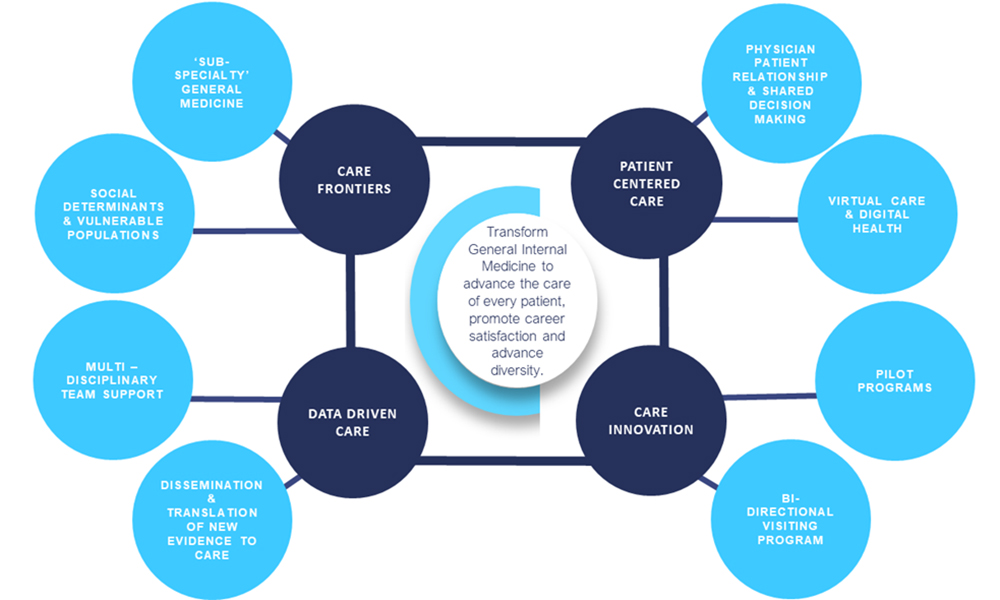Center for Transformation of Internal Medicine (CENTRI)
Contact Information
Explore This Program
Mission
The Center for the Transformation of Internal Medicine (CENTRI) in the Division of General Internal Medicine (DGIM) was established in 2021 by a transformative gift to advance the care of every patient, promote the career satisfaction of general internists, and advance workforce enrichment and engagement in primary care. CENTRI is designed to evaluate innovative clinical or educational programs in primary care, with a particular focus on projects that address social determinants of health, vulnerable populations, or virtual care and digital health. Its goal is to expand research support for the DGIM educators and innovators, who do not have formal research training, to help them develop better evidence to support clinical practice and to support the work of researchers to develop evidence to inform practice. It is focused on four pillars of innovation: care frontiers, patient-centered care, data-driven care, and care innovation.
Four Guiding Pillars of Innovation
CENTRI is focused on four pillars of innovation: care frontiers, patient-centered care, data-driven care, and care innovation.

Faculty & Staff
 Jennifer S. Haas, MD, MSc
Jennifer S. Haas, MD, MScPeter L. Gross, MD, Chair in Primary Care
Director of Research & Research Education, Division of General Internal Medicine, Massachusetts General Hospital
Professor of Medicine, Harvard Medical School
Professor of Social & Behavioral Sciences, Harvard T.H. Chan School of Public Health
 Suzanne Brodney, PhD
Suzanne Brodney, PhD
Investigator, Division of General Internal Medicine, Massachusetts General Hospital
 Yuchiao Chang, PhD
Yuchiao Chang, PhD
Associate Professor of Medicine, Division of General Internal Medicine, Massachusetts General Hospital
 Sue Regan, PhD
Sue Regan, PhD
Investigator, Division of General Internal Medicine, Massachusetts General Hospital
Meghan Rieu-Werden
Senior Systems Analyst, Division of General Internal Medicine, Massachusetts General Hospital
Jacquelyn Lykken, PhD
Senior System Analyst, Division of General Internal Medicine, Massachusetts General Hospital
 Jessica Pham-Stephens, MHA, SHRM-CP
Jessica Pham-Stephens, MHA, SHRM-CP
Grant Administrator, Division of General Internal Medicine, Massachusetts General Hospital

Katherine Gallagher, BS
Clinical Research Coordinator II, Division of General Internal Medicine, Massachusetts General Hospital

Caylin Marotta, MPH
Senior Clinical Research Coordinator, Division of General Internal Medicine, Massachusetts General Hospital
Ashvika Boopathy, BS
Clinical Research Coordinator I, Division of General Internal Medicine, Massachusetts General Hospital
Current CENTRI Projects
Integration of a Colorectal Cancer Screening Decision Support Tool Primary Care
Team Members: Karen Blumenthal, MD; Katherine D. Rose, MD; Maria Eliopoulos, RPH; Moshe A. Rancier, MD; Lauren Leavitt; Meghan Rieu-Werden; Yuchiao Chang, PhD; Suzanne Brodney, PhD; Caylin Marotta, MPH; Katherine Gallagher; Emily Messmer; Karen Sepucha, PhD
Years: 2023-2026
This project will test if a CRC screening decision support tool that is part of the Annual Visit Primary Care Screening Bundle, offered in advance of a primary care visit, increases CRC screening completion rates. The decision tool was developed by Mass General Brigham and has been integrated into Epic. Primary care practices have been randomized to receive the decision support tool or usual care. Patients aged 45-75 years complete the tool on Patient Gateway prior to the visit or via an iPad at the visit. CRC completion rates will be assessed 6 months after the intervention period. To better understand decision making and preference concordance around CRC screening discussions, a follow-up project surveyed 1000 patients who were either assigned the CRC screening decision support tool (intervention) or the patient was eligible for the bundle but not assigned (control). In addition, primary care providers from the Mass General Brigham primary care practices where the bundle was assigned were surveyed about their experience. A poster was presented at the 2025 SGIM Annual Meeting. The final analysis will be completed in October 2025, and a manuscript is in development.
Pharmacist referrals in primary care: A descriptive study
Team Members: Karen Blumenthal MD, MPH; Anthony Ishak, PHARMD; Yuchiao Chang, PhD; Meghan Rieu-Werden, TuTran Nguyen, RPH; Caylin Marotta, MPH; Suzanne Brodney, PhD; Jennifer Haas, MD, MSc
Years: 2023-2025
Mass General Brigham has integrated a dedicated, experienced, full-time academic ambulatory pharmacist in primary care and the pharmacist is working with two primary care clinics. The goal of this project is to describe the outcomes of the referrals to the clinical pharmacist and then compare blood pressure control for those who worked with the pharmacist to a matched cohort who did not work with a pharmacist. Data analysis was completed in August 2025 and a manuscript will be submitted in Q4 2025.
Medications for alcohol use disorder in hospitalized patients: A medical center's experience and analysis
 Team Members: Daniel Liauw, MD; Sue Regan, PhD; Caylin Marotta, MPH; Suzanne Brodney, PhD; Michael Barry, MD; Eugene Lambert, MD
Team Members: Daniel Liauw, MD; Sue Regan, PhD; Caylin Marotta, MPH; Suzanne Brodney, PhD; Michael Barry, MD; Eugene Lambert, MD
Years: 2024-2025
The purpose of this study is to describe adult alcohol-related hospitalizations at Massachusetts General Hospital from April 2017 through September 2024. The analysis examined the cohort of hospitalized patients with alcohol use disorder (AUD) with an alcohol withdrawal syndrome diagnosis to characterize medication for AUD prescribing on discharge. Three abstracts were presented at conferences: American Society of Addiction Medicine (April 24-27,2025), Society of General Internal Medicine (May 14-17, 2025), and College on Problems of Drug Dependence (June 14-18, 2025). A manuscript is under review, and another manuscript is in development.
VIBE: Emulating a Stepped Wedge Trial Design to Assess the Impact of Virtual AI-Based Scribes on Primary Care Providers
Team Members: Lidia Maria Moura MD, PhD; Meghan Rieu-Werden; Yuchiao Chang, PhD; Katherine Gallagher; Suzanne Brodney, PhD; Jennifer Haas, MD, MSc
Years: 2024-2025
This research is exploring whether using virtual AI-based scribes can make it easier and faster for primary care doctors to complete their patient documentation, which is the written summary of each patient visit. We also want to find out if this technology can help reduce burnout among doctors, especially those with complex patient needs or a high number of non-English-speaking patients. Two manuscripts are under review and another is in development.
Prescriptions for Weight Loss Medication and Referrals for Lifestyle Interventions and Bariatric Surgery in Primary Care at Mass General Brigham
Team Members: Ksenia Blinnikova, MD, MPH; Suzanne Brodney, PhD; Jacquelyn Lydden, PhD; Yuchiao Chang, PhD; Katherine Gallagher; Jennifer Haas, MD, MSc
Years: 2024-2025
The objective of this project is to describe the patient, provider and clinic characteristics of patients with obesity who were sent an initial prescription for weight loss medication and describe referrals for lifestyle interventions and bariatric surgery in MGB primary care practices. A second phase of this project will survey primary care physicians to understand factors that influence decision making about treating obesity with weight loss medication and referrals to lifestyle interventions and bariatric surgery. The survey will be distributed in October 2025. An initial manuscript is expected in Q4 2025.
Mass General Brigham Community Care Vans Colorectal Cancer Screening Program
Team Members: Priya Gupta, MD, MPH; Suzanne Brodney, PhD; Cesar Guerra Castillo; Sue Regan, PhD; Caylin Marotta, MPH; Jennifer Haas, MD, MSc
Years: 2025-2026
The Mass General Brigham Community Care Vans program is expanding clinical services to include colorectal cancer (CRC) screening for high-risk populations in the greater Boston area. The program will introduce CRC screening through non-invasive fecal immunochemical tests (FIT) and will provide a dedicated Cancer Patient Navigator to guide patients through the screening process and connect them to follow-up care. The goal of this CENTRI project is to evaluate the outcomes of the CRC efforts on the Mass General Brigham Community Care Vans.
Continuous Glucose Monitoring for Glycemic Control of People with Insulin-Treated Diabetes
Team Members: Madeline Fiore, MD; Kristen Flint, MD; Sue Regan, PhD; Suzanne Brodney, PhD; Caylin Marotta, MPH; Ashvika Boopathy; Michael Barry, MD
Continuous glucose monitoring (CGM) is a medical device that improves the glycemic control of people with insulin-treated diabetes by providing them with comprehensive 24-hour glucose data. Pilot data was collected in Spring 2024 from a 12-month intervention to build the operational infrastructure and clinical knowledge necessary to empower primary care clinicians to prescribe CGM. Data showed that CGM prescriptions for Medicare patients doubled from 8% to 14% over a 12-week period.. This project will expand and evaluate an existing pilot project on prescribing, integrating and utilizing continuous glucose monitors in primary care. We plan to conduct qualitative interviews to explore how primary are clinicians and their patients engage in conversations about CGMs.
Medication for Opioid Use Disorder Adherence for MGH Bridge Clinic Patients
Team Members: Joanna Streck, PhD; Jennifer Haas, MD, MSc; Sue Regan, PhD; Suzanne Brodney, PhD; Caylin Marotta, MPH, Sarah Wakeman, MD
Years: 2025-2026
The goal of this proposal is to describe the day-to-day variability and longitudinal trajectories of buprenorphine adherence, substance use, and social determinants of health (SDoH) within a cohort of 30 adults initiating treatment at the MGH Bridge Clinic. We will collect daily data from incentivized text diaries across 3 months and surveys at baseline and 3 months. Buprenorphine use will be self-reported via text messages and confirmed via chart review of state prescription drug program logs exported from Massachusetts Department of Public Health.
Completed CENTRI Projects
Primary Care Equity Initiative
Team Members: Andrew Hwang, MD, MPH; Sarah Matathia, MD, MPH; Michael Barry, MD; Vanessa Adjei; Aisha James, MD, MEd; Suzanne Brodney, PhD; Victoria Nixon; Yuchiao Chang PhD; Meghan Rieu-Werden
Years: 2021 – 2023
As part of the Mass General Brigham United Against Racism (UAR) initiative, primary care launched a practice-level equity dashboard that displays ambulatory quality outcome metrics stratified by race and language. Five practices were assigned to the UAR initiative, and 10 practices are serving as controls. All practices have equity huddles led by population health coordinators, but the five UAR practices also have community health workers who can outreach to patients to provide additional hypertension support. We used a stepped-wedge design to randomize the timing of when physicians and their patients would receive the intervention. This approach was chosen so that the resources would be distributed equitably. Data collection was completed in September 2023 and the manuscript was published.
Hwang AS, Chang Y, Matathia S, Brodney S, Barry MJ, Horn DM. Effectiveness of a Population Health Intervention on Disparities in Hypertension Control: A Stepped Wedge Cluster Randomized Clinical Trial. J Gen Intern Med. 2024 Nov;39(15):3028-3034. doi: 10.1007/s11606-024-08839-y. Epub 2024 Jun 12. PMID: 3886500.
A second manuscript is under development.
Virtual Group Visits
Team Members: Jacob Mirsky, MD; Suzanne Brodney, PhD; Anne Thorndike, MD, MPH
Years: 2021-2022
Virtual Group Visits (VGV) support patients in making lifestyle behavior changes, and it holds promise as a primary care delivery tool for preventing and managing chronic diseases. This project is evaluating VGV invitees’ satisfaction with and preferences for VGVs at the Mass General Revere HealthCare Center. Patients who attended a visit during the prior year were surveyed and asked for their input. Results from this project were published in two manuscripts: one describing patient attendance and perceived benefits:
Mirsky J, Brodney S, Boratyn V, Thorndike AN. Lifestyle Medicine Virtual Group Visits: Patient Attendance and Perceived Benefits. American Journal of Lifestyle Medicine. 2023;0(0). doi:10.1177/15598276231208164)
and the other describing patient perspectives on VGV appointments:
Vigue D, Mirsky J, Brodney S, Thorndike AN. Patient Perspectives on Lifestyle Medicine Virtual Group Visits. Am J Lifestyle Med. 2024 Sep 2:15598276241274233. doi: 10.1177/15598276241274233. Epub ahead of print. PMID: 39554912
Flex Nutrition Services
 Team Members: Sarah Matathia, MD, MPH; Saja Alani, MPH; Kristen Risley PMP, MSW, Sue Regan, PhD; David Cheng, PhD; Suzanne Brodney, PhD; Katherine Gallagher; Anne Thorndike, MD, MPH
Team Members: Sarah Matathia, MD, MPH; Saja Alani, MPH; Kristen Risley PMP, MSW, Sue Regan, PhD; David Cheng, PhD; Suzanne Brodney, PhD; Katherine Gallagher; Anne Thorndike, MD, MPH
Years: 2022-2024
As part of the Medicaid Accountable Care Organization (ACO) Flexible Services Program, members with a health needs-based criteria who are experiencing food insecurity can receive nutritional support through the Flex Nutrition Program. We will randomize eligible members into three cohorts. Cohort A will receive high intensity proactive outreach via phone, Cohort B will receive low-intensity outreach via letter, and Cohort C will receive usual care with no proactive outreach. We evaluated if proactive outreach to eligible patients increases enrollment into and utilization of the Medicaid ACO Flex Nutrition Program. A poster was presented at the 2025 SGIM Annual Meeting. A manuscript is under review.
Nurse-Led Diabetes Education Sessions
Team Members: Kerri A. Pagliuca, RN; Lisa M. Brugnoli-Semeta, RN; Julie B. Marden, CNP; Suzanne Brodney, PhD; Katherine Gallagher; Meghan Rieu-Werden; Jennifer Haas, MD, MSc
Years: 2022-2024
The objective of this project was to implement and evaluate a 3-session, nurse-led diabetes management education program with peer support for nurses to help patients in primary care with uncontrolled type 2 diabetes better manage their condition. The nursing team implemented the clinical program in five primary care practices and the program includes an initial phone call and three in-person or virtual visits that will be conducted over four months. The research project surveyed nurses at baseline, 4 months and 8 months to evaluate if the program improves nurse’s confidence with managing patients with uncontrolled diabetes. We hypothesized that engaging and supporting nurses to educate patients with uncontrolled diabetes through structured educational and goal setting visits would improve nursing confidence in providing diabetes education, improve patient A1C levels and improve patient engagement. A poster was presented at the American Academy of Ambulatory Care Nursing (AAACN) in May 2025. A manuscript is in preparation.
Evaluating the Acceptability and Clinical Impact of a Preventive Genetic Counseling Service
Team Members: Leland Hull, MD, MPH; Sue Regan, PhD; Suzanne Brodney, PhD; Caylin Marotta, MPH; Jennifer Haas, MD, MSc
Years: 2023-2024
Given the high demand for preventative genetics services, limited access to genetic subspecialists, and the logistical barriers to screening, this study evaluated the implementation of a “fast track” genetics screening service. The new genetics screening workflow included an EPIC referral being placed by a clinician, a pre-visit phone call to collect personal and family medical history, and a streamlined visit with a genetics counselor. This study examined whether the clinical model was acceptable to key stakeholder groups by collecting and analyzing qualitative and survey data. A manuscript was submitted in June 2025.
Cross-sectional Population Study of Patients with Substance Use Disorders at the MGH Health Centers
 Team Members: Wei Sum Li, MD, James Morrill, MD, PhD; Meghan Rieu-Werden; Suzanne Brodney, PhD; Caylin Marotta, MPH; Danielle Fine, MD, MSc
Team Members: Wei Sum Li, MD, James Morrill, MD, PhD; Meghan Rieu-Werden; Suzanne Brodney, PhD; Caylin Marotta, MPH; Danielle Fine, MD, MSc
Years: 2023-2024
Since initiation of the MGH Substance Use Disorders Initiative in 2014, the MGH Health Centers have developed a robust set of services to care for a large population of patients with Substance Use Disorders (SUD), including medication for SUD, OBAT (office-based addiction treatment) Nursing, SUD-focused behavioral health care, multidisciplinary risk rounds, and Recovery Coaching. However, the scope and characteristics of the patient population being managed has not been assessed. We conducted a cross-sectional study of patients treated for SUD at the MGH health centers to describe the patient population, medical comorbidity, and the cascade of SUD care. A poster was presented at the 2025 SGIM Annual Meeting. A manuscript was submitted in August 2025.
Identifying Mental Health Needs for Patients with Sickle Cell Disease (SCD) at MGH’s SCD Treatment Clinic
Team Members: Jennifer Hong, MD; Adaugo Amobi, MD, MPH; Aisha James, MD, MEd; Sharl Azar, MD; Meghan Rieu-Werden; Suzanne Brodney, PhD; Caylin Marotta, MPH; Jennifer Haas, MD, MSc
Years: 2023-2024
Primary care is the central anchor for many patients with SCD. The goal of this project was to develop a data registry of patients with SCD to determine screening, treatment, and referral practices for other conditions that patients with SCD may have or develop as a result of SCD. An analysis describing the emergency department presentation, inpatient admissions and preventative health screens was completed. A poster was presented at the 2025 SGIM Annual Meeting. The manuscript titled, Impact of Integrated Primary Care on Care Utilization and Preventative Care for Patients with Sickle Cell Disease, was published in JGIM.
Hong JY, Chang Y, Rieu-Werden ML, Brodney S, James A, Azar S, Haas JS. Impact of Integrated Primary Care on Care Utilization and Preventative Care for Patients with Sickle Cell Disease. J Gen Intern Med. 2025 Apr 29. doi: 10.1007/s11606-025-09542-2. Epub ahead of print. PMID: 40301220.
Transgender Health Cohort
Team Members: Jenny Siegel, MD; Alex McDowell, PhD, MPH, MSN, RN; Meghan Rieu-Werden; Suzanne Brodney, PhD; Caylin Marotta, MPH; Michael Barry, MD
Years: 2023-2025
The goal of this project is to clarify and refine methods used to identify patients such that there is user-friendly dataset that can be analyzed to address key questions and hypotheses pertaining to the health needs of transgender and gender diverse persons. Once the data set is optimized for analysis, it could be used for a descriptive study of the health care epidemiology for people in this cohort to better understand where and with what frequency individuals received care across our system. A poster was presented at the 2025 SGIM Annual Meeting. A manuscript is under review.
Frequently Asked Questions
How do I know if CENTRI is the right opportunity for me?
This opportunity is right for you if you are:
- Interested in research and evaluation but need some extra support to develop your idea
- Motivated to take a lead role in the research project and welcome the opportunity to present your results at a scientific meeting and write up your results for publication
- Feeling you are at a time in your career when you want to try something new
Does the project have to focus on primary care?
All projects funded by CENTRI must have a focus within primary care delivery.
Can I apply if I’ve never done research?
Prior research experience is not required. A central initiative of CENTRI is to expand research support for DGIM educators and innovators, who do not have formal research training to help them develop better evidence to support clinical practice.
Please note, all applicants must complete the MGB Human Research Trainings prior to the award/start of the proposed project.
What types of projects do you fund?
A core pillar of the CENTRI program is to promote the delivery of patient-centered primary care by supporting the evaluation of care innovation. Please see the list of current and completed CENTRI projects.
What type of assistance do you offer?
The program is designed to evaluate interesting clinical or educational innovations. CENTRI can provide support for project management, data collection, and data analysis. Projects should be very focused and have a timeline of 12 months or less.
When are applications due?
The call for proposal applications is typically announced in January or February each year. Of note, CENTRI applications are continuously open to provide timely support of innovative research ideas. Please contact Jessica Pham-Stephens at jpham-stephens@mgb.org to learn more about the application process and/or request an application.
What does the application include?
The CENTRI Proposal Application form includes:
- A paragraph overview of the goals, design and scientific hypothesis to be tested/evaluated
- A paragraph explaining how support from CENTRI would influence the quality of care that you deliver
- The expertise provided by the application team
- The expertise requested from CENTRI
Do you fund salary?
CENTRI will now support the time of each pilot project Principal Investigator for up to 0.1 FTE for one year. This will provide the PI with the opportunity to fully participate and be successful in leading the pilot project.
Who do I contact if I have an idea or want to learn more?
To learn more about CENTRI or submit an idea for a CENTRI proposal, please contact Jessica Pham-Stephens (jpham-stephens@mgb.org).
